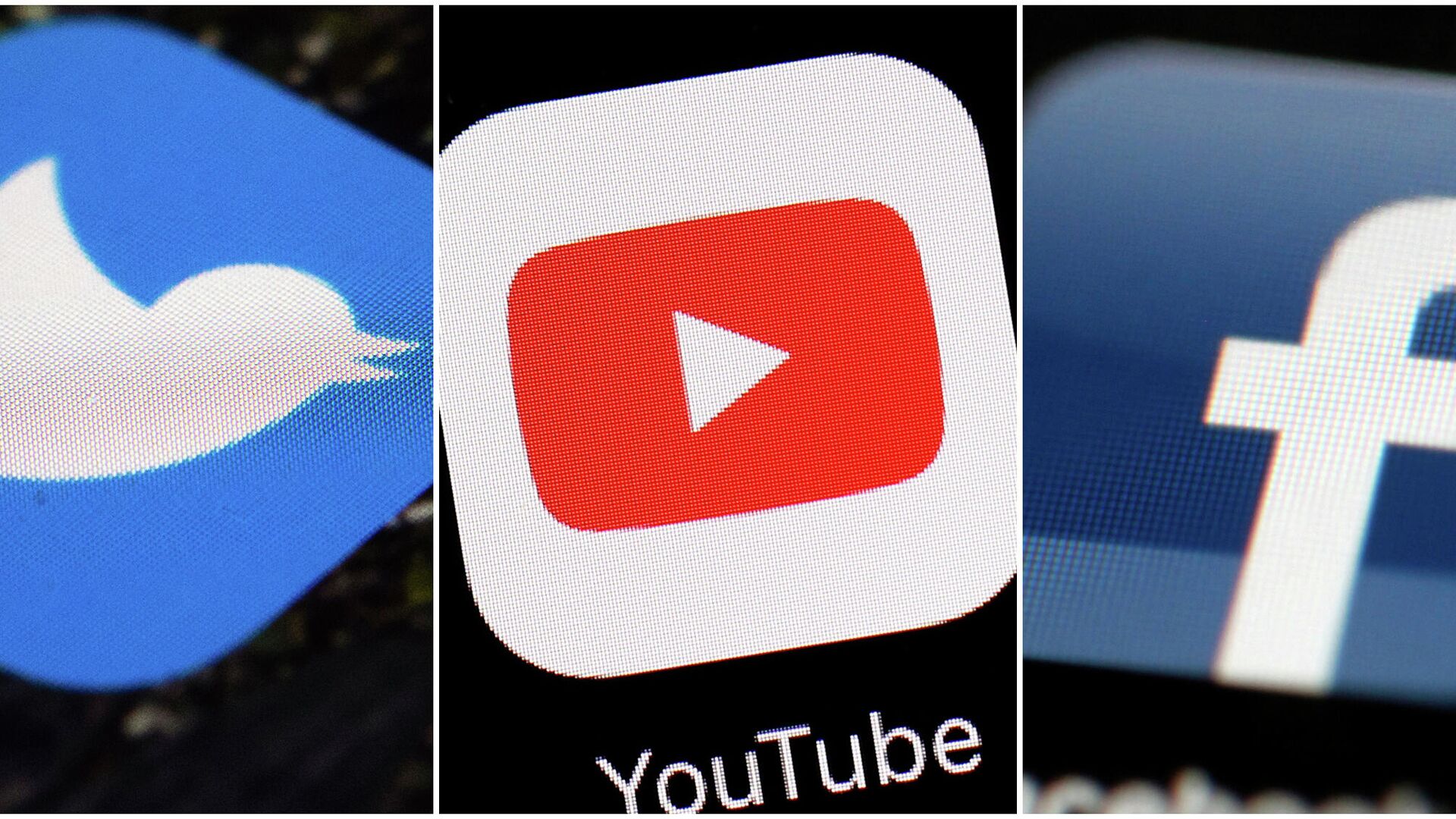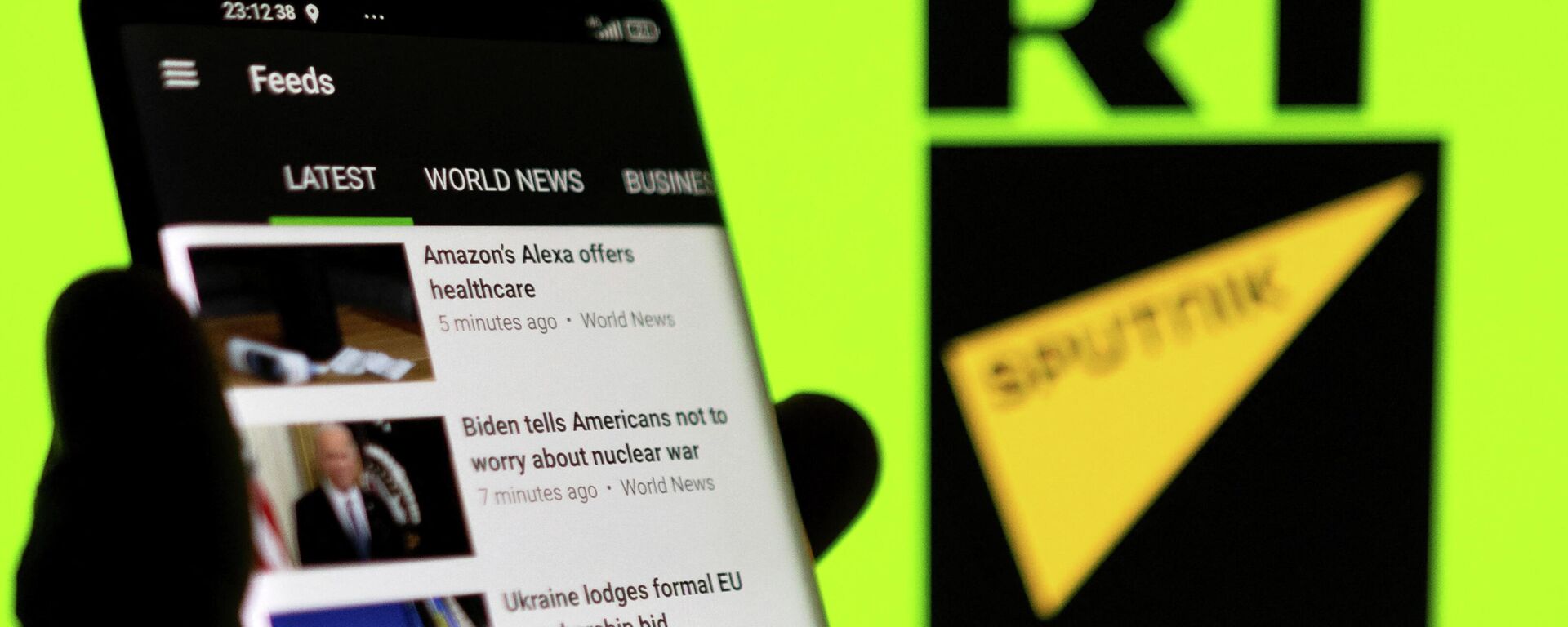https://sputnikglobe.com/20220708/how-uk-bill-shields-mainstream-media--axes-russian-news-under-guise-of-press-freedom--1097111750.html
How UK Bill Shields Mainstream Media & Axes Russian News Under Guise of Press Freedom
How UK Bill Shields Mainstream Media & Axes Russian News Under Guise of Press Freedom
Sputnik International
The British government has tabled an amendment to the Online Safety Bill seeking to prevent social media giants from taking down mainstream news without an... 08.07.2022, Sputnik International
2022-07-08T14:58+0000
2022-07-08T14:58+0000
2023-05-28T15:20+0000
press freedom
online safety
sputnik explains
social media
united kingdom (uk)
https://cdn1.img.sputnikglobe.com/img/07e6/01/0d/1092242790_207:0:2223:1134_1920x0_80_0_0_99de4f9517de8fbfc78c7b78cfb3c0dd.jpg
"Social media is now the main source of information about the world for 16-24-year-olds, and for all ethnic minorities in the UK," explained Ellis Cashmore, honorary professor of sociology at Aston University in the UK.The Online Safety Bill was first introduced in the British Parliament in March 2022 with the aim of holding social media platforms, search engines and various websites to account for hosting illegal activities or spreading harmful content.The newly introduced amendment is "designed to guard against the arbitrary removal of articles from journalists at recognized news outlets when shared on social media platforms," according to the UK government's website. The authors of the amendment draw attention to the fact that half of British adults use social media for news, with Facebook*, Twitter and Instagram* being the most popular platforms. When it comes to 16-24 year-olds, the internet is the most-used platform.Once the bill comes into force, social media giants would be required "to ensure recognized news publishers’ articles remain viewable and accessible on their sites even if they are under review by moderators."The introduction of the new amendment can be explained by the fact that the tech giants have proved themselves impossible to control, the professor explained.Still, the new amendment is focused on so-called "category one companies", which include "the largest and most popular social media platforms", and is not designed to shield alternative media sources.The bill's selective approach has been manifested by its earlier amendment obligating social media platforms "to proactively look for and remove disinformation from foreign state actors which harm the UK." It specifically singles out Russian news, with an obvious reference to Sputnik News and RT - both previously banned by the EU and social media giants after the beginning of the Russian special operation to de-militarize and de-Nazify Ukraine.The professor notes that wiping Russian news from the media sphere is senseless given that many westerners are interested in learning Russian perspectives. "This does not mean they would be persuaded or even influenced, but they feel entitled to make up their own minds independently. They have been denied that facility," Cashmore stressed."Since February, Russia, its people and its values have been condemned, denounced and stigmatized," said the professor. "Vladimir Putin has been personally vilified. It is difficult to see this ending, at least not for 30 years. Russia has been excluded from many world affairs and many believe Russia and the other BRICS countries may coalesce into an international configuration to rival NATO. This would become a new world order."Meanwhile, the bill's amendments have raised concerns among British campaigners who are warning the government that in its current form the proposed internet safety laws are “on the verge of being unworkable," according to The Independent.In particular, campaigners have advocated for a number of measures to strengthen freedom of expression and rights safeguards to better protect people from marginalized backgrounds and expand transparency requirements on firms to boost access to data for researchers and academics.*Facebook and Instagram are banned in Russia over extremist activities.
https://sputnikglobe.com/20220427/facebook-doesnt-know-what-happens-to-users-data-how-it-spreads-as-regulators-tighten-their-grip-1095106215.html
https://sputnikglobe.com/20220302/eu-bans-work-of-sputnik-news-agency-broadcasting-of-rt-tv-channel-in-the-community-from-2-march-1093519475.html
united kingdom (uk)
Sputnik International
feedback@sputniknews.com
+74956456601
MIA „Rossiya Segodnya“
2022
News
en_EN
Sputnik International
feedback@sputniknews.com
+74956456601
MIA „Rossiya Segodnya“
Sputnik International
feedback@sputniknews.com
+74956456601
MIA „Rossiya Segodnya“
press freedom, online safety, sputnik explains, social media, united kingdom (uk)
press freedom, online safety, sputnik explains, social media, united kingdom (uk)
How UK Bill Shields Mainstream Media & Axes Russian News Under Guise of Press Freedom
14:58 GMT 08.07.2022 (Updated: 15:20 GMT 28.05.2023) The British government has tabled an amendment to the Online Safety Bill seeking to prevent social media giants from taking down mainstream news without an appeal process. While London is declaring this to be a further boost to journalism protections, this new safety net is not meant to be applied on alternative media sources.
"Social media is now the main source of information about the world for 16-24-year-olds, and for all ethnic minorities in the UK," explained Ellis Cashmore, honorary professor of sociology at Aston University in the UK.
"Yet platform moderators have practically unrestricted power to edit, and, if they wish, remove content. This is an unheard-of censorial power. I can't think that, in history, proprietors have ever had such colossal power to control the flow and content of information, not just to one population, but to the world."
The Online Safety Bill was first introduced in the British Parliament in March 2022 with the aim of holding social media platforms, search engines and various websites to account for hosting illegal activities or spreading harmful content.
The newly introduced
amendment is "designed to guard against the arbitrary removal of articles from journalists at recognized news outlets when shared on social media platforms," according to the UK government's website. The authors of the amendment draw attention to the fact that half of British adults use social media for news, with Facebook*, Twitter and Instagram* being the most popular platforms. When it comes to 16-24 year-olds, the internet is the most-used platform.
Once the bill comes into force, social media giants would be required "to ensure recognized news publishers’ articles remain viewable and accessible on their sites even if they are under review by moderators."
The introduction of the new amendment can be explained by the fact that the tech giants have proved themselves impossible to control, the professor explained.
"Tech companies operate in a relatively unrestricted way and governments around the world usually rely on the companies' goodwill," he said.
Still, the new amendment is focused on so-called "category one companies", which include "the largest and most popular social media platforms", and is not designed to shield alternative media sources.
The bill's selective approach has been manifested by its earlier
amendment obligating social media platforms "to proactively look for and remove disinformation from foreign state actors which harm the UK." It specifically singles out Russian news, with an obvious reference to Sputnik News and RT -
both previously banned by the EU and social media giants after the beginning of the Russian special operation to de-militarize and de-Nazify Ukraine.
"Freedom of speech and expression are highly valued principles in western Europe and North America," says Cashmore. "But it is interesting that, after the beginning of the conflict in Ukraine, there were no protests at the decisions of western governments to prohibit broadcasts and news supplies from RT, Sputnik and maybe a few less important news outlets."
The professor notes that wiping Russian news from the media sphere is senseless given that many westerners are interested in learning Russian perspectives. "This does not mean they would be persuaded or even influenced, but they feel entitled to make up their own minds independently. They have been denied that facility," Cashmore stressed.
"Since February, Russia, its people and its values have been condemned, denounced and stigmatized," said the professor. "Vladimir Putin has been personally vilified. It is difficult to see this ending, at least not for 30 years. Russia has been excluded from many world affairs and many believe Russia and the other BRICS countries may coalesce into an international configuration to rival NATO. This would become a new world order."
Meanwhile, the bill's amendments have raised concerns among British campaigners who are warning the government that in its current form the proposed internet safety laws are “on the verge of being unworkable,"
according to The Independent.
In particular, campaigners have advocated for a number of measures to strengthen freedom of expression and rights safeguards to better protect people from marginalized backgrounds and expand transparency requirements on firms to boost access to data for researchers and academics.
*Facebook and Instagram are banned in Russia over extremist activities.



